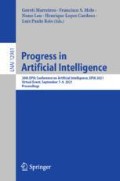Abstract
The demand and interest for personalized, efficient, and inexpensive healthcare solutions has significantly increased over the last decade to overcome the major limitations of existing traditional healthcare approaches. This new trend relies on the definition of intelligent mechanisms that can persuade the end-user to achieve health-related outcomes and ultimately improve his health condition and well-being. In this sense, the work here proposed explores a Multi-Agent System composed by personal agents that follow user preferences and a coaching agent which relies on a reinforcement learning approach to identify the most impactful messages to persuade a certain agent to follow established health-related goals. To validate the proposed system, a set of simulations were performed considering different types of persuasive messages and we were able to identify the most adequate sequence of messages that can persuade different users to achieve health-related goals based on their preferences.
Access this chapter
Tax calculation will be finalised at checkout
Purchases are for personal use only
References
Li, Y., Mutchler, J.E.: Older adults and the economic impact of the COVID-19 pandemic. J. Aging Soc. Policy 32, 477–487 (2020)
Clarke, L.: An introduction to economic studies, health emergencies, and COVID-19. J. Evid. Based Med. 13, 161–167 (2020)
Laborde, D., Martin, W., Vos, R.: Impacts of COVID‐19 on global poverty, food security, and diets: Insights from global model scenario analysis. Agri. Econ. (2021)
Papoutsi, E., Giannakoulis, V.G., Ntella, V., Pappa, S., Katsaounou, P.: Global burden of COVID-19 pandemic on healthcare workers. Eur. Respir. Soc. (2020)
Miller, I.F., Becker, A.D., Grenfell, B.T., Metcalf, C.J.E.: Disease and healthcare burden of COVID-19 in the United States. Nat. Med. 26, 1212–1217 (2020)
Chawla, N.V., Davis, D.A.: Bringing big data to personalized healthcare: a patient-centered framework. J. Gen. Intern. Med. 28, 660–665 (2013)
Costa, A., Heras, S., Palanca, J., Jordán, J., Novais, P., Julián, V.: Argumentation schemes for events suggestion in an e-Health platform. In: International Conference on Persuasive Technology, pp. 17–30. Springer, Cham (2017). https://doi.org/10.1007/978-3-319-55134-0_2
Costa, A., Heras, S., Palanca, J., Novais, P., Julián, V.: A persuasive cognitive assistant system. In: International Symposium on Ambient Intelligence, pp. 151–160. Springer, Cham (2016). https://doi.org/10.1007/978-3-319-40114-0_17
Costa, A., Heras, S., Palanca, J., Novais, P., Julián, V.: Persuasion and recommendation system applied to a cognitive assistant. ADCAIJ: Adv. Distrib. Comput. Artif. Intell. J. Salamanca 5, (2016). (ISSN: 2255–2863)
Alkiş, N., Findik-Coşkunçay, D.: Use of persuasion strategies in mobile health applications. In: Sezgin, E., Yildirim, S., Yildirim, S.Ö., Sumuer, E. (eds.) Current and Emerging mHealth Technologies, pp. 9–21. Springer, Cham (2018). https://doi.org/10.1007/978-3-319-73135-3_2
Qasim, M.M., Ahmad, M., Omar, M.: Persuasive strategies in mobile healthcare: a systematic literature review. Literatures 87, 7 (2017)
de Vries, R.A.J., Truong, K.P., Zaga, C., Li, J., Evers, V.: A word of advice: how to tailor motivational text messages based on behavior change theory to personality and gender. Pers. Ubiquit. Comput. 21(4), 675–687 (2017). https://doi.org/10.1007/s00779-017-1025-1
Donadello, I., Dragoni, M., Eccher, C.: Explaining reasoning algorithms with persuasiveness: a case study for a behavioural change system. In: Proceedings of the 35th Annual ACM Symposium on Applied Computing, pp. 646–653 (2020)
Anselma, L., Mazzei, A.: Building a persuasive virtual dietitian. In: Informatics, p. 27. Multidisciplinary Digital Publishing Institute (2020)
Leo, M., Carcagnì, P., Mazzeo, P.L., Spagnolo, P., Cazzato, D., Distante, C.: Analysis of facial information for healthcare applications: a survey on computer vision-based approaches. Information 11, 128 (2020)
Sengan, S., Kamalam, G., Vellingiri, J., Gopal, J., Velayutham, P., Subramaniyaswamy, V.: Medical information retrieval systems for e-Health care records using fuzzy based machine learning model. Microprocess. Microsyst. 103344 (2020)
Mardani, A., et al.: Application of decision making and fuzzy sets theory to evaluate the healthcare and medical problems: a review of three decades of research with recent developments. Expert Syst. Appl. 137, 202–231 (2019)
Yu, C., Liu, J., Nemati, S.: Reinforcement learning in healthcare: a survey. arXiv preprint arXiv:1908.08796 (2019)
Coronato, A., Naeem, M., De Pietro, G., Paragliola, G.: Reinforcement learning for intelligent healthcare applications: a survey. Artif. Intell. Med. 109, 101964 (2020)
Martinho, D., Carneiro, J., Novais, P., Neves, J., Corchado, J., Marreiros, G.: A conceptual approach to enhance the well-being of elderly people. In: Moura Oliveira, P., Novais, P., Reis, L.P. (eds.) EPIA 2019. LNCS (LNAI), vol. 11805, pp. 50–61. Springer, Cham (2019). https://doi.org/10.1007/978-3-030-30244-3_5
Martinho, D., Vieira, A., Carneiro, J., Martins, C., Almeida, A., Marreiros, G.: A definition of a coaching plan to guide patients with chronic obstructive respiratory diseases. In: Rocha, Á., Adeli, H., Reis, L.P., Costanzo, S., Orovic, I., Moreira, F. (eds.) WorldCIST 2020. AISC, vol. 1161, pp. 54–64. Springer, Cham (2020). https://doi.org/10.1007/978-3-030-45697-9_6
Cialdini, R.B.: The Psychology of Persuasion. New York (1993)
Cialdini, R.B., Cialdini, R.B.: Influence: The Psychology of Persuasion. Collins, New York (2007)
Prochaska, J.O., DiClemente, C.C.: Stages and processes of self-change of smoking: toward an integrative model of change. J. Consult. Clin. Psychol. 51, 390 (1983)
Bidargaddi, N., et al.: To prompt or not to prompt? A microrandomized trial of time-varying push notifications to increase proximal engagement with a mobile health app. JMIR mHealth uHealth 6, e10123 (2018)
Acknowledgments
The work presented in this paper has been developed under the EUREKA - ITEA3 Project PHE (PHE-16040), and by National Funds through FCT (Fundação para a Ciência e a Tecnologia) under the under the project UIDB/00760/2020 and by NORTE-01-0247-FEDER-033275 (AIRDOC - “Aplicação móvel Inteligente para suporte individualizado e monitorização da função e sons Respiratórios de Doentes Obstrutivos Crónicos”) by NORTE 2020 (Programa Operacional Regional do Norte).
Author information
Authors and Affiliations
Corresponding author
Editor information
Editors and Affiliations
Rights and permissions
Copyright information
© 2021 Springer Nature Switzerland AG
About this paper
Cite this paper
Martinho, D., Carneiro, J., Neves, J., Novais, P., Corchado, J., Marreiros, G. (2021). A Reinforcement Learning Approach to Improve User Achievement of Health-Related Goals. In: Marreiros, G., Melo, F.S., Lau, N., Lopes Cardoso, H., Reis, L.P. (eds) Progress in Artificial Intelligence. EPIA 2021. Lecture Notes in Computer Science(), vol 12981. Springer, Cham. https://doi.org/10.1007/978-3-030-86230-5_21
Download citation
DOI: https://doi.org/10.1007/978-3-030-86230-5_21
Published:
Publisher Name: Springer, Cham
Print ISBN: 978-3-030-86229-9
Online ISBN: 978-3-030-86230-5
eBook Packages: Computer ScienceComputer Science (R0)

